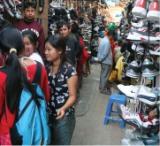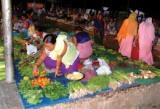Archives
BUSTLING MOREH
Life seems much more vibrant here than in Imphal city which closes down at six in the evening under the shadow of guns. Nobody in Moreh is willing to talk about the looming shadow of insurgents. People have apparently learnt to take this oddity in their stride as life and business have to go on under any circumstance.
 The border market at Namphalang right on the road that demarcates the international boundary is the heart of activities in Moreh. Everything under the sun and mostly made in China and a large range of agriculture, horticulture products are brought to the market every day by over 2000 Burmese traders. Beetle nuts and varied horticulture products, rubies, Chinese toys, umbrellas, sleek electronic gadgets, slippers, shoes, Myanmarese ethnic apparel, Chinese - made garments, goods from Vietnam and Thailand and what not – all are available in the ‘super market’ at Namphalong. The traders from the Indian side come to this market with medicines, electronic goods, cosmetics, steel items, hardware, biscuits and many other items which are bought by people from Myanmar.
The border market at Namphalang right on the road that demarcates the international boundary is the heart of activities in Moreh. Everything under the sun and mostly made in China and a large range of agriculture, horticulture products are brought to the market every day by over 2000 Burmese traders. Beetle nuts and varied horticulture products, rubies, Chinese toys, umbrellas, sleek electronic gadgets, slippers, shoes, Myanmarese ethnic apparel, Chinese - made garments, goods from Vietnam and Thailand and what not – all are available in the ‘super market’ at Namphalong. The traders from the Indian side come to this market with medicines, electronic goods, cosmetics, steel items, hardware, biscuits and many other items which are bought by people from Myanmar.
The Chinese presence is over whelming in the market because of the items available. “It is like China using Myanmar nationals as agents for trading their products in India without directly getting involved in it. Because of its close ties with Myanmar, China can send in most of the products to Mynamar without having to pay any duty and the same find way into India through Moreh market,” says Ishantor Sabhapondit, an official of Indian Chamber of Commerce (ICC) which has been lobbying for an increase in the volume of official trade with Myanmar by expanding the official list of items for bi-lateral trade.
| Nobody in Moreh is willing to talk about the looming shadow of insurgents. People have apparently learnt to take this oddity in their stride as life and business have to go on under any circumstances. |
“Officially, the bilateral trade between India and Myanmar is allowing for export of jeera and sugar from India and import of only beetle nut from Myanmar. But that hardly matters here. The volume of trade in items not listed for official bi-lateral trade has been burgeoning though there is hardly any proper infrastructure for it,” says K B Subramaniam, public relation secretary of Border Trade and Chamber of Commerce at Moreh .
“The only bank that operates in Moreh is a branch of the United Bank of India and the bank uses the service of helicopters to carry money collected at the branch to Imphal office as it is risky to transport such a huge consignment of currency notes through a terrain infested with insurgents though there is heavy presence of Assam Rifles and Manipur police too,” said an official of the Moreh chamber.
 Residents of Moreh will tell you that the town may be small but it is truly cosmopolitan in nature. Manipuri Meiteis, Kuki tribals, Tamils, Punjabis and even Burmese nationals with their trademark sarongs and conical cane hats walk the streets with their wares. Unlike Imphal, Moreh stays awake till late night. Liquor vends dot the main road that passes through the town. The beer brands that line the glass show cases reflects Moreh plurality—Burmese beer, the cheap Dali from China, and German and Dutch beer etc. Mind you that this is a reality in an otherwise ‘dry state’.
Residents of Moreh will tell you that the town may be small but it is truly cosmopolitan in nature. Manipuri Meiteis, Kuki tribals, Tamils, Punjabis and even Burmese nationals with their trademark sarongs and conical cane hats walk the streets with their wares. Unlike Imphal, Moreh stays awake till late night. Liquor vends dot the main road that passes through the town. The beer brands that line the glass show cases reflects Moreh plurality—Burmese beer, the cheap Dali from China, and German and Dutch beer etc. Mind you that this is a reality in an otherwise ‘dry state’.
There is more to the Moreh border business hub than meets the eye. Besides being the heart of a thriving official and unofficial trade, it is also the main transit point of drug trafficking in Manipur. Customs officials in the town say drugs are often brought in from the Burmese side hidden in consignments of clothes and food. Though random checks are carried out both by Assam Rifles and Customs officials, it is just not possible to check each and every consignment crossing over clandestinely along a border that is completely open and as such drugs such as cannabis, mandrake etc. have a free thoroughfare.
THE MARKET
 The informal international trading market of Namphalong on the Myanmar side and the traders from Moreh take the route through the Indo-Myanmar Friendship Gate.
The informal international trading market of Namphalong on the Myanmar side and the traders from Moreh take the route through the Indo-Myanmar Friendship Gate.
The entry from Moreh to Namphalong market that is a few yards into the Burmese border is free. On the main market street, Burmese women selling various items are discernible by the sandalwood paste smeared across their faces to cope with the scorching sun and humidity.
As the official trade with Myanmar is on the decline, it is Chinese goods that are dominating the Myanmar markets. The only business that remains unaffected by the Chinese influx is in the importing of Burmese teak. Moreh is lined with shops importing teak from across the border.
Wholesalers come from Imphal and even from other states to buy teak furniture from Moreh and then supply this to the rest of the country.
In the wake of Prime Minister Dr. Manmohan Singh’s visit to Myanmar in May 2012 hope among the traders in Moreh has been fueled regarding the possibility of an increase in the bi-later trade volume. The Manipur government too has acquired over 45 acres of land near Namphalong international market to build a customs office and a land port. It will house banks, currency exchange counters, immigration, customs offices and India’s own state-of-the-art international market.
| Manipuri Meiteis, Kuki tribals, Tamils, Punjabis and even Burmese nationals with their trademark sarongs and conical cane hats walk the streets with their wares. Unlike Imphal, Moreh stays awake till late night. |
Border fencing is also underway. Manipur’s first railway line, which is to enter Imphal by 2013, will lead to Moreh, cutting through the border to eventually make its way to Mandalay in Myanmar. The Border Roads Organisation, which has already built a highway from Imphal to Kalewa in Myanmar, will now build 70 bridges and upgrade roads in the neighbouring country to provide smooth passage for traders and tourists. All these have added immense potential to Moreh becoming a thriving international trade hub and land prices have already started going up though as of now, the infrastructure is in a pitiable state. There is not a single hotel in Moreh worth the name though some entrepreneurs are talking about setting up resorts here once the scenario is transformed for the better in respect to the bi-lateral trade.
The 2011 Census puts Moreh’s population at 16,000. The Meitei Council in the city disputes this figure, saying that the population is at least 35,000. The tribals, specifically the Kukis, say their population in the town is 20,000. People from other parts of the country have always been coming to Moreh to make money and adding to the cosmopolitan nature of the hub.

